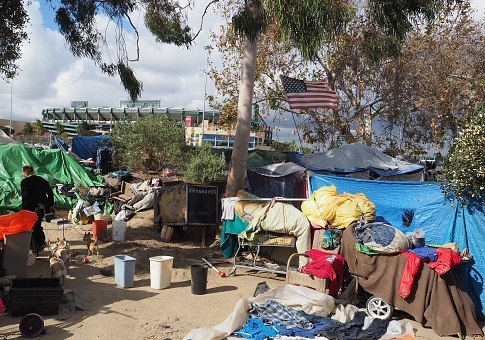Faced with an intractable housing crisis, California voters went to the polls Tuesday to cast ballots in order to bring down the sky-high price of homes.
The results saw voters overwhelmingly beat down proposals that could have driven up housing prices—including rejecting a rent control measure—in favor of encouraging a freer market in housing.
It is sometimes impossible to find a home in California. The state is ranked 49th in the nation in per capita housing supply. The median home price is just under $550,000, more than double the national average. In major cities, median prices reach as high as $1.3 million. And price trends show little sign of reversing—prices have more than doubled since the Great Recession.
The primary cause of the sky-high housing prices is government, as onerous rules and regulations limiting the construction of new houses choke off a much-needed supply. Zoning restrictions, parking rules, building requirements, and green initiatives all contribute to the absurd undersupply, and therefore absurdly high cost, of housing.
The burden of all of this falls unambiguously on California's poor—the state has the nation's highest poverty rate, (using the right measure, that is). A housing crisis means a homelessness crisis: The Golden State accounts for about 12 percent of the U.S. population, but a full 31 percent of all people experiencing homelessness, and 51 percent of people specifically living without any shelter whatsoever. According to the state auditor, "more than two‑thirds of California's homeless are living in vehicles, abandoned buildings, parks, or on the street."
Thanks to all of this, housing reared its head as an issue up and down the ballot. At the top of the ticket, Governor-elect Gavin Newsom (D.) was forced to own the surging prices under Democrats' single-party rule in the state, promising to build some 3.5 million new housing units by 2025.
Across the state, voters had four different housing-related ballot propositions to opine on. Props. 1 and 2, which both passed, respectively issued $4 billion in bonds partially for housing programs and authorized the state to use revenue to build new "homelessness prevention housing." Props. 5 and 10, which failed, would have expanded a property tax break and allowed cities the discretion to impose rent control, respectively.
Prop. 10 was far and away the most high-profile—and heavily spent on—initiative of the four. If passed, it would have allowed counties and cities to set their own rent control ordinances, imposing limits on how much landlords can charge their tenants. Proponents of the idea argued that it would help rein in rising rents for those at the edge of eviction, helping to keep the state's homeless population from swelling further.
But 61 percent of Californians disagreed. They sided instead with those who pointed out that by reducing the benefits of building, rent control would further constrain the supply of housing in California, thereby indirectly exacerbating the housing crisis.
Prop. 10 "does the opposite of what it's trying to achieve and essentially pours gasoline on the housing crisis fire in the state because it will freeze housing construction in the state," Democratic party consultant Steve Maviglio told the Pacific Research Institute in an interview. Newsom, the governor-elect, also opposed Prop. 10.
Prop. 5 was defeated by a similar proportion—58 percent to 41 percent—and likely for similar reasons. The proposal would have expanded the ability of certain homeowners—primarily those over 55 and the disabled—to transfer their property tax assessment on an old house to a new house, effectively allowing them to preserve a lower property tax rate while acquiring a larger piece of property.
Supporters of Prop. 5 argued that it could reduce the housing crisis by inducing empty nesters to move out of their homes, increasing the stock of available housing units. But voters apparently disagreed, likely for two reasons. One is that, according to the nonpartisan State Legislative Analyst's Office, the initiative would have spurred higher demand among present homeowners and thus overall raised home prices.
The other related objection was that the benefits of the proposition would have accrued to California’s already wealthy property holders. Many of these, the State Legislative Analyst’s Office concluded, regularly move anyway. They needed no added incentive from a tax break. At the same time, the proposition would have meant lost property tax revenue that could have been used to support the affordable housing many voters desperately need.
Curbing the homelessness crisis also drove debate around San Francisco's Prop. C, which pitted tech giants against tech giants over a proposed $300 million corporate tax to fund the city's homelessness programs. Salesforce founder and co-CEO Marc Benioff broke from Silicon Valley peers like Twitter's Jack Dorsey, backing Prop. C and challenging the latter's commitment to charitable giving in a heated Twitter exchange.
